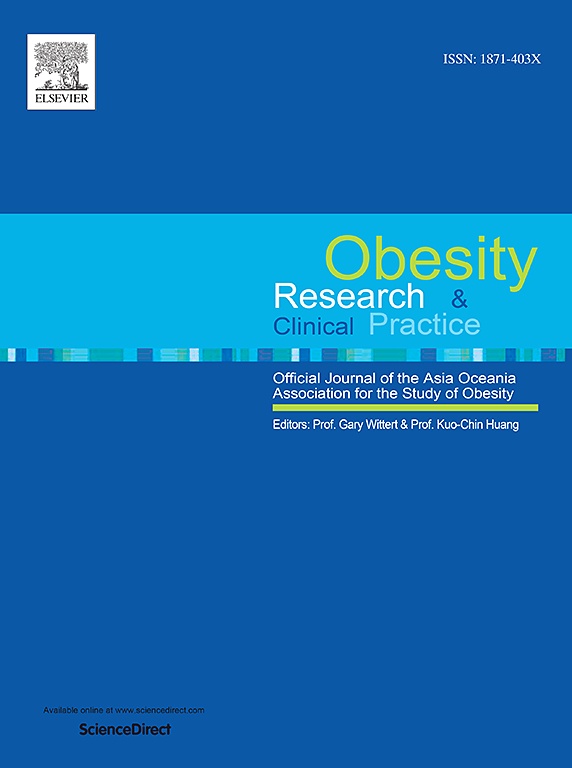Emotional and behavioral problems associated with food addiction in children and adolescents with obesity
IF 2.5
4区 医学
Q3 ENDOCRINOLOGY & METABOLISM
引用次数: 0
Abstract
Objective
This observational study investigated the association between food addiction (FA) and emotional and behavioral problems in children and adolescents with obesity.
Method
This study enrolled 224 children and adolescents with body mass index (BMI) above the 85th percentile (mean age: 11.37). Along with anthropometric measurements, various psychosocial characteristics such as the Youth Self Report (YSR), self-esteem scale, and family function were investigated through questionnaires. Using the Yale Food Addiction Scale for Children (YFAS-C), all participants were divided into the FA and non-FA groups.
Results
The FA group had a higher BMI z-score, lower self-esteem scale score, and lower family function than the non-FA group. The FA group showed significantly higher YSR subscale T-scores, including total problems, internalization, and externalization, and a higher proportion of participants in the borderline and clinical group on the YSR total problems and problem behavior syndrome scales. Linear regression analysis showed that the YFAS-C symptom count score was independently associated with higher total YSR problems (β=0.036, 95 % CI [0.014, 0.059]) and externalizing t-scores (β=0.042, 95 % CI [0.020, 0.064]), and tended to be associated with internalizing t-scores (β=0.021, 95 % CI [-0.0004, 0.042]).
Conclusions
FA was significantly associated with emotional and behavioral problems in children and adolescents with obesity. Therefore, understanding FA in children and adolescents is important for the prevention and treatment of obesity and psychosocial difficulties.
肥胖儿童和青少年与食物成瘾相关的情绪和行为问题。
目的:本观察性研究探讨了儿童和青少年肥胖患者食物成瘾与情绪和行为问题之间的关系。方法:本研究纳入224名体重指数(BMI)高于85百分位(平均年龄11.37岁)的儿童和青少年。除了人体测量外,还通过问卷调查了青少年自我报告(YSR)、自尊量表和家庭功能等各种社会心理特征。使用耶鲁儿童食物成瘾量表(YFAS-C),所有参与者被分为吃饱组和不吃饱组。结果:与非FA组相比,FA组BMI z得分较高,自尊量表得分较低,家庭功能较低。在YSR总问题、内在化和外在化量表上,FA组显著高于对照组,在YSR总问题和问题行为综合征量表上,边缘组和临床组的比例显著高于对照组。线性回归分析显示,YFAS-C症状计数评分与较高的YSR总问题(β=0.036, 95 % CI[0.014, 0.059])和外化t-评分(β=0.042, 95 % CI[0.020, 0.064])独立相关,并倾向于与内化t-评分相关(β=0.021, 95 % CI[-0.0004, 0.042])。结论:FA与儿童和青少年肥胖患者的情绪和行为问题显著相关。因此,了解儿童和青少年的FA对于预防和治疗肥胖和社会心理困难非常重要。
本文章由计算机程序翻译,如有差异,请以英文原文为准。
求助全文
约1分钟内获得全文
求助全文
来源期刊

Obesity research & clinical practice
医学-内分泌学与代谢
CiteScore
7.10
自引率
0.00%
发文量
80
审稿时长
49 days
期刊介绍:
The aim of Obesity Research & Clinical Practice (ORCP) is to publish high quality clinical and basic research relating to the epidemiology, mechanism, complications and treatment of obesity and the complication of obesity. Studies relating to the Asia Oceania region are particularly welcome, given the increasing burden of obesity in Asia Pacific, compounded by specific regional population-based and genetic issues, and the devastating personal and economic consequences. The journal aims to expose health care practitioners, clinical researchers, basic scientists, epidemiologists, and public health officials in the region to all areas of obesity research and practice. In addition to original research the ORCP publishes reviews, patient reports, short communications, and letters to the editor (including comments on published papers). The proceedings and abstracts of the Annual Meeting of the Asia Oceania Association for the Study of Obesity is published as a supplement each year.
 求助内容:
求助内容: 应助结果提醒方式:
应助结果提醒方式:


